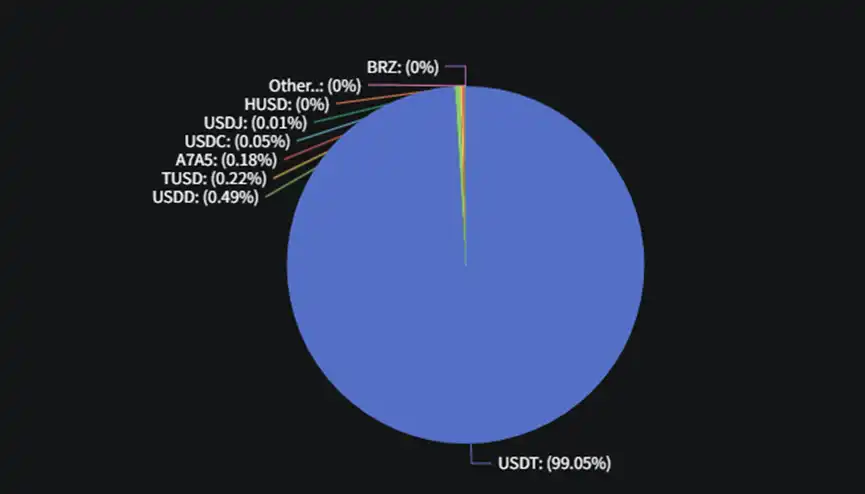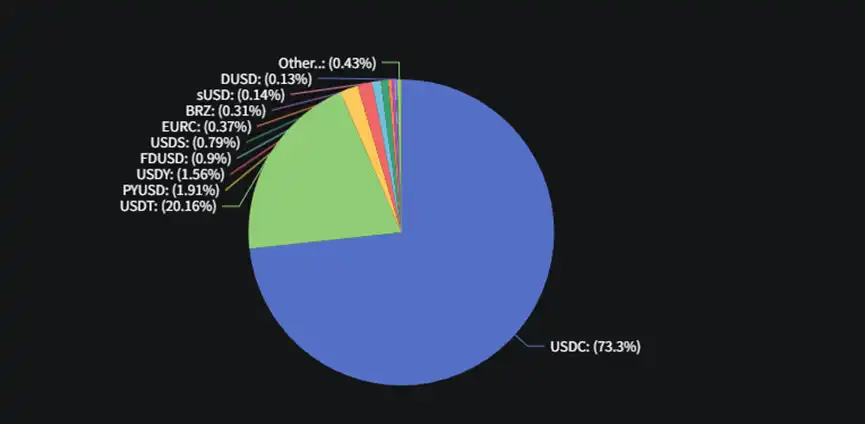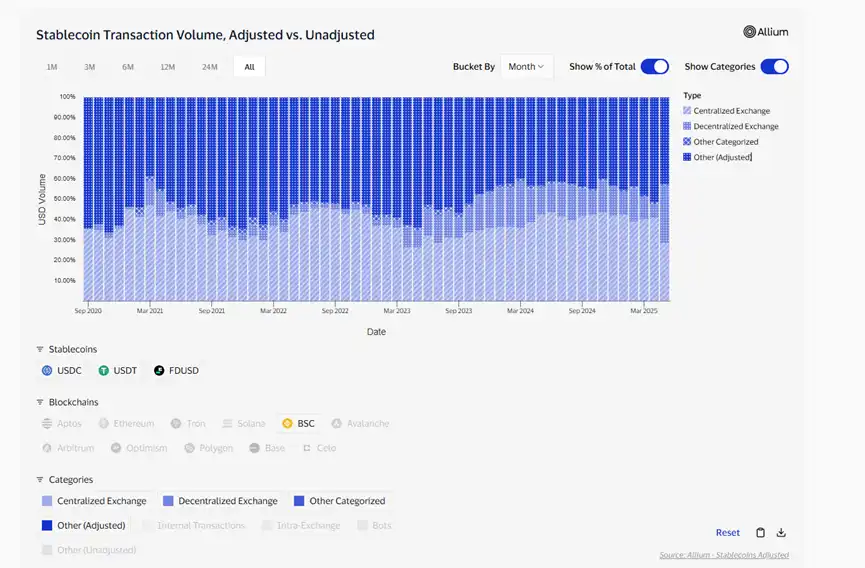Original Title: "12 Public Chain Stablecoin Ecosystem Overview: SUI Grows the Fastest, USDT Issuance on Tron Exceeds Ethereum"
Original Author: Frank, PANews
In 2025, stablecoins have become the most关注ed area in the crypto market. As of May 22, the total market capitalization of stablecoins has surpassed $245 billion. Behind the rapid growth of stablecoins is a hidden battlefield of competition among various public chains. As one of the main forms of asset accumulation, stablecoins are not only indicators of asset flow changes but also important measures of public chains' market recognition. PANews has analyzed the stablecoin data of the top 12 public chains to outline a panoramic view of the development of public chain stablecoins.

Ethereum: Holding Half the Market Share with USDC Growth
Ethereum's stablecoin market capitalization is $122.5 billion, accounting for 50% of all stablecoin issuance. The stablecoin with the highest share on Ethereum is still USDT, which accounts for about 50%. However, from the perspective of USDT, the issuance on Ethereum has seen a decline entering 2025. According to PANews statistics, the issuance of USDT on the Ethereum chain grew by 83.1% throughout 2024, but as of May 21, 2025, the issuance of USDT on Ethereum had decreased by 5.07%. This has directly allowed Tron to leap to become the largest issuing public chain for USDT.

In addition to USDT, Ethereum is also the largest issuing public chain for USDC. As of May 22, the issuance of USDC on Ethereum has reached 36.9 billion, with Ethereum's issuance share at 60.82%. In October 2024, the issuance of USDC on Ethereum was only 25.2 billion, showing a growth of 46.4% in about six months. The significant growth of USDC has also become a major reason for Ethereum to maintain its half share of the stablecoin market.
Tron: The Largest Issuing Public Chain for USDT, The Busiest On-chain Dollar "Distribution Hub"
Tron's stablecoins mainly come from USDT, accounting for over 99%, making it the largest issuing public chain for USDT. Tron holds about 31.3% of the global stablecoin market share. According to CryptoQuant data, Tron's average daily trading volume of USDT reaches around 2.4 million transactions, while Ethereum's figure is only 284,000.

In terms of transaction volume, the Tron network processes an average of $20 billion in USDT transfers daily, accounting for nearly 29% of the total global stablecoin transaction volume. In terms of user activity, over 1 million unique accounts conduct USDT transactions on Tron daily, representing 28% of all active stablecoin wallet addresses across blockchains.
In terms of growth trends: the supply of USDT on Tron increased from $48.8 billion in 2024 to $59.7 billion. In 2025, Tether issued an additional $18 billion of USDT on Tron, bringing the total supply of USDT on Tron to $77.7 billion. The reason for this is that Tron's low fees and high transaction speed make it the preferred network for a large number of USDT transactions, especially favored by retail users and emerging markets.
Additionally, due to the close collaboration between Tron founder Justin Sun and the Trump family, more possibilities for Tron's stablecoin prospects have emerged. In May, Zack Witkoff, co-founder of the Trump family project WLFI (World Liberty Financial), stated that the USD stablecoin USD1 issued by WLFI will also be natively issued on the Tron chain. Justin Sun also revealed in January this year that he hopes to significantly reduce transaction fees, ultimately achieving free transfers. However, as of now, the next steps of this plan have not been disclosed.
Solana: The Acceleration Engine Under High TPS
As one of the hottest public chains in the past two years, stablecoins have also seen significant growth on the Solana chain. From $1.8 billion at the beginning of 2024, it surged to a peak of $13.1 billion in May, an increase of 627%. In terms of both volume and growth rate, Solana is an emerging force in the stablecoin field that cannot be ignored.
Of course, Solana's current total stablecoin market capitalization is about $11.4 billion, which still has a significant gap compared to Tron and Ethereum, especially with more than a 10-fold difference from Ethereum. However, considering that Solana's DEX trading volume has already surpassed Ethereum, but the issuance of stablecoins still has a huge gap compared to Ethereum, the application of stablecoins within Solana's ecosystem is still not very widespread.

From an internal structure perspective, USDC is the preferred stablecoin on Solana, holding a 73% market share. USDT accounts for about 20% on Solana. PYUSD issued by PayPal currently has a market capitalization of $200 million on the Solana chain, second only to Ethereum, accounting for about 24.36%. Solana is now one of the preferred options for many new stablecoins.

BSC: Zero Gas and USD1 Dual Drive
As of May 2025, BSC accounts for about 2.4% of the global stablecoin market share. The stablecoin market capitalization on the BSC chain has experienced several leaps in growth since 2024, increasing from $4 billion to about $10 billion, with an increase of about 150%. The two concentrated growth phases occurred once from November 2024 to January 2025, growing from around $5 billion to $7 billion. The second phase was from the end of April 2025 to May, rapidly increasing from $7 billion to $9 billion. Analysis suggests that the first growth may primarily stem from the zero GAS fee initiative launched on the BSC chain. The second was driven by the issuance of the USD1 stablecoin on the BSC chain. The recently popular USD1 currently has 99.26% of its issuance on the BSC chain, with a total issuance of about $2.1 billion.
The previously promoted BUSD and FUSD on BSC have seen their combined share drop to about 3%. The issuance of USDT accounts for about 59%, while USD1 accounts for about 21%. Visa Onchain Analytics data shows that with the recent increase in the popularity of the Binance wallet, the share of stablecoin DEX trading on the BSC chain has risen from less than 10% in April to 28%, nearly matching the share of centralized trading platforms.

Additionally, in May, BSC accounted for 38.1% of all chains in terms of stablecoin transaction volume, ranking first. In terms of cumulative trading volume of USDT, BSC, with $358 billion, is only lower than Tron and Ethereum. It can be said that in the stablecoin race, BSC and Solana have become the most competitive new forces.
Base: The Growth Champion Empowered by Coinbase
Base, as an Ethereum L2 incubated by Coinbase, has achieved significant growth in various data aspects during this cycle, and the same is true in the stablecoin field. In terms of stablecoin market capitalization, Base has grown from $177 million in January 2024 to $4.09 billion, with a growth rate of 2210%, making it the public chain with the largest increase among the top five in stablecoin market capitalization.
USDC is the most mainstream stablecoin on the Base chain, accounting for 97.8%. Base is also the public chain with the largest cumulative trading volume of USDC, aside from Ethereum.
Hyperliquid: A New Vault for Derivatives Whales
As a new battleground for whales, Hyperliquid has shown great potential despite its short launch time. In less than half a year, its stablecoin market capitalization has reached $3.26 billion, surpassing established public chains like Arbitrum, Polygon, and Avalanche.
From an ecological application perspective, Hyperliquid, as a decentralized derivatives trading platform, primarily uses USDC as the trading asset. Therefore, USDC is the largest stablecoin on Hyperliquid, accounting for 97.8%. However, it is worth noting that as a public chain, Hyperliquid has recently added new stablecoin types such as feUSD, USDT, and USDe. Although the current issuance and trading volume are not high, it has opened up some new ports for the application of public chain ecosystems.
Arbitrum: A Sharp Drop After Incentive Disruption
Arbitrum: A Roller Coaster Ride for Stablecoin Market Capitalization
As a highly regarded Ethereum L2, Arbitrum's stablecoin market capitalization has experienced significant fluctuations during this cycle. Throughout 2024, Arbitrum's stablecoin market cap grew from $2 billion to a peak of $6.9 billion. However, at the beginning of 2025, Arbitrum's stablecoin market cap saw a sharp decline, quickly dropping to $2.73 billion in January. On January 2, a single day's outflow amounted to $2 billion. This drastic decrease may primarily stem from three reasons: first, on December 17, the previous round of Incentives Detox ended, causing liquidity subsidies for about 50 protocols to be abruptly cut off, leading to a concentrated withdrawal of market-making funds after the rewards expired. Second, Tether announced that starting January 29, it would migrate USDT on Arbitrum to a new cross-chain standard "USDT0." Lastly, the high-yield competitive chain Blast's deposit contracts promised a 5% annualized return plus Airdrop Points for USDC/USDT, continuously attracting L2 assets since its launch at the end of November.
Polygon: USDC Migration and Payment Testing Ground
From 2024 to the present, Polygon's stablecoin market cap has risen from $1.26 billion to approximately $2.15 billion, an annual increase of nearly 70%. The key driver behind this growth is the native USDC launch by Circle and the pilot programs for fiat and stablecoin settlements by giants like Visa and Mastercard on PoS chains, bringing in enterprise-level increments. Currently, the stablecoin share on the Polygon chain is dominated by USDT and USDC, which hold 40.79% and 47% of the market, respectively.
Avalanche: Fee Reductions Fail to Achieve Explosive Growth
Avalanche's growth over the past year has been somewhat lackluster. Although the overall stablecoin market cap has increased by 79%, this growth has stagnated since May 2024, oscillating between $1 billion and $2 billion. At the end of 2024, the Avalanche 9000 upgrade reduced the base fees on the C-Chain by 96%, significantly lowering the costs of small stablecoin transfers and batch settlements. However, this positive development has not sustained momentum for Avalanche; perhaps only an overall increase in ecosystem activity can truly drive the growth of stablecoins.
Aptos: The Dark Horse of the Move Ecosystem
The total market cap of stablecoins on Aptos surpassed $1 billion for the first time in the first quarter of 2025, showing an overall increase of 2408% as of May, making it one of the fastest-growing public chains. As a public chain within the MOVE ecosystem, Aptos and Sui are emerging competitors. The stablecoins on the Aptos chain are primarily composed of USDT and USDC, with USDT accounting for about 62.39% and USDC about 32%. Given that native USDC only launched on Aptos in January 2025, this growth has been remarkably swift.
Sui: A High-Growth Chain with 230-Fold Increase
Sui has seen the largest growth in stablecoins among all public chains. At the beginning of 2024, the stablecoin market cap on the Sui network was only around $5 million, but by May 2025, this figure had surged to $1.156 billion, an astonishing increase of 230 times. Currently, USDC is the most issued stablecoin on the Sui network, accounting for about 75%. However, the current volume of stablecoins in the Sui ecosystem is still relatively low, and the variety of issued stablecoins is limited. Attracting more large capital into the Sui ecosystem is a major growth challenge, and the recent theft incident involving Cetus on May 22 may also raise concerns about its security, presenting a situation of both opportunity and risk.
TON: Telegram's Social Support Struggles for Growth
TON, as a newcomer to the battlefield in 2024, has also achieved rapid growth within a year. In April 2024, Tether announced the simultaneous issuance of USDT and XAUT on the TON chain, making it its 15th supported network, aiming to bring Telegram's 900 million users directly into the on-chain dollar payment ecosystem. After its launch, wallets and various Telegram trading bots quickly integrated, allowing new users to send and receive USDT with zero barriers using just their phone numbers. This has laid the foundation for the growth of stablecoins in the TON ecosystem. By June 2024, the issuance of USDT on TON reached $519 million. However, the growth of stablecoins in the TON ecosystem began to decline in 2025 after a brief surge, currently falling from $1.4 billion at the beginning of the year to around $900 million. This may be related to the lack of significant hotspots in the TON ecosystem following the popularity of click games.
Conclusion
Currently, the competitive landscape for stablecoins on public chains is still undergoing rapid changes. While Ethereum, Tron, and other public chains still hold significant first-mover advantages, the rise of several popular public chains like Solana and BSC is gradually eating into the leading market share, and the issuance of new stablecoins like USD1 is no longer limited to Ethereum. Meanwhile, the MOVE ecosystem public chains Aptos and Sui, despite having a shorter minting time for stablecoins, show a clear advantage in growth rates. It is foreseeable that competition in the stablecoin space will become even more intense. For established public chains, there is dual pressure to maintain market share while continuing to grow. For new public chains, it marks the beginning of a rapid expansion phase in a market characterized by wild growth. As stablecoin regulations gradually take shape around the world, the story of stablecoins is just beginning.
免责声明:本文章仅代表作者个人观点,不代表本平台的立场和观点。本文章仅供信息分享,不构成对任何人的任何投资建议。用户与作者之间的任何争议,与本平台无关。如网页中刊载的文章或图片涉及侵权,请提供相关的权利证明和身份证明发送邮件到support@aicoin.com,本平台相关工作人员将会进行核查。




